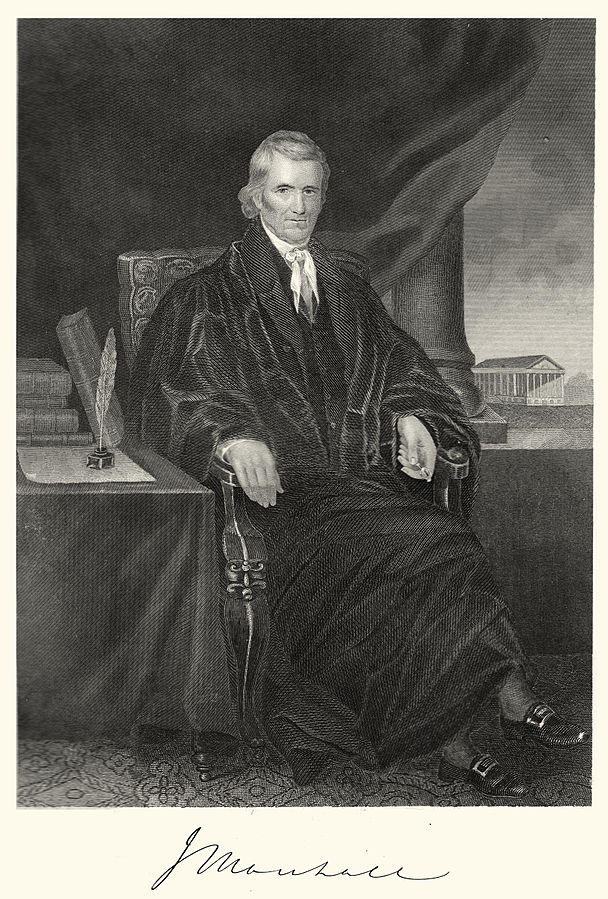
 Portrait of Chief Justice John Marshall, 1862
Portrait of Chief Justice John Marshall, 1862
In order to better understand the evolution or devolution of the USPTO, we must rely on sources that are both knowledgeable and reasonably objective (or make their biases known upfront). Justin Blows' useful blog (authored by an Australian patent lawyer) is all about software patents and it now covers many recent examples of software patent cases in the US [1, 2, 3, 4, 5, 6]. Among these examples this morning we see this lawsuit from a Microsoft-connected mega-troll, Intellectual Ventures, a lawsuit from Trading Technologies, which has been stockpiling software patents, and a lawsuit from IBM, a proponent of software patents and patent aggressor. What all 9 have in common (all of them were published at 6 AM GTM) is that they involve software patents used offensively in the courts, irrespective of their outcome, which Mr. Blows is trying to analyse in order to assess prospects of software patents in the US.
"...we must rely on sources that are both knowledgeable and reasonably objective (or make their biases known upfront)."A firm of patent lawyers has just released a paper in support of software patents and calls it a "Comprehensive Study" (probably for perceived legitimacy). It has been advertised using a paid press release and based on the title alone we can see the bias ("Enforcing Software Innovation" is gobbledygook).
"Are Software Patents Relevant?"
That's the title of this good new article which states:
While proponents (usually with deep pockets) have touted their benefits, software patents have also been used in the software industry to suppress innovation, kill competition, generate undeserved royalties, and make patent attorneys rich. So I ask, are software patents still relevant?
It’s no secret that the engineering software business is extremely competitive, as it always has been. The engineering software business has also proven to be a very fertile ground for lawsuits regarding patent infringement, reverse engineering, and outright copying and pasting blocks of code.
"Patents are completely inadequate for this area/domain.""A rare instance of PTAB finding patent-eligible subject matter in a covered business method case," wrote a patent lawyer about this article regarding PTAB. It says that the "The U.S. Patent Trial and Appeal Board (PTAB) recently found a business method patent eligible under 35 U.S.C. €§ 101, in one of the first such decisions since the institution of Covered Business Method (CBM) Patent Reviews and the Supreme Court’s decision in Alice Corp. Pty Ltd. v. CLS Bank Int’l, 134 S. Ct. 2347 (2014)."
Bear in mind that for patents on software or business methods to survive Alice is the exception now. As Bilski Blog has just put it (publishing new charts and figures): "It's difficult to say whether we've reached a steady state as to the boundaries of patent eligibility. The high rates of ineligibility decisions is likely to incent patent defendants to continue to argue against more traditional types of software. At some point, the courts will likely say enough is enough, and start to hold the line. Attempting to time the market is a fool's errand."
"The very existence of software patents makes the job of programming (coding/development) uncertain if not impossible."Alice/ۤ 101 has changed so much for the better. It's a rare case of SCOTUS versus patent lawyers (greed) and lobbying from large corporations. Based on this updated list of upcoming SCOTUS patent cases, there's still nothing that can annul or undo Alice, however there will be a decision regarding design patents.
Speaking of €§ 101, this new article says that yesterday "the Court [was] scheduled to consider grant of certiorari in Retirement Capital Access Management Co. LLC v. U.S. Bancorp, No. 15-591, where the firstQuestion Presented asks “[w]hether subject matter eligibility under 35 U.S.C. €§ 101 is a ground specified as a condition for patentability [for post-grant review] under 35 U.S.C. €§ 282(b)(2).”"
Things do change in the US and they certainly change for the better when it comes to software patents. If only more groups, such as the EFF (focused on trolls), worked towards the same goal...
Intuitively speaking -- and studies serve to reaffirm this -- no software developer really wants software patents. The very existence of software patents makes the job of programming (coding/development) uncertain if not impossible. ⬆
"The Moral Law tells us the tune we have to play: our instincts are merely the keys."
--C.S. Lewis